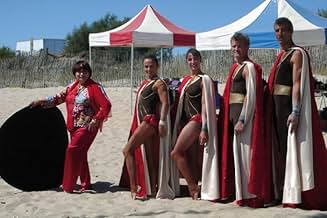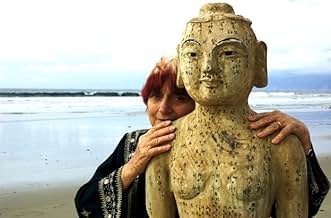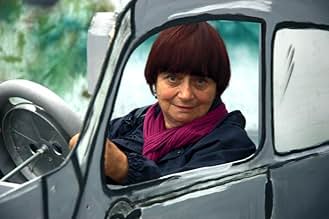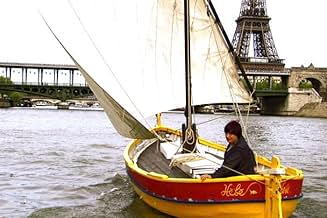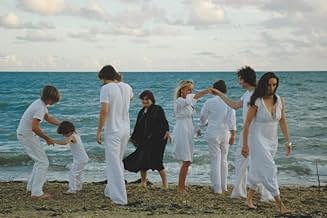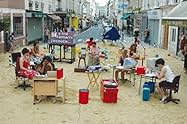CALIFICACIÓN DE IMDb
8.0/10
5.1 k
TU CALIFICACIÓN
Agnès Varda explora sus recuerdos, en su mayoría cronológicamente, con fotografías, clips de películas, entrevistas, recreaciones y escenas contemporáneas divertidas y divertidas en las que ... Leer todoAgnès Varda explora sus recuerdos, en su mayoría cronológicamente, con fotografías, clips de películas, entrevistas, recreaciones y escenas contemporáneas divertidas y divertidas en las que narra su historia.Agnès Varda explora sus recuerdos, en su mayoría cronológicamente, con fotografías, clips de películas, entrevistas, recreaciones y escenas contemporáneas divertidas y divertidas en las que narra su historia.
- Premios
- 12 premios ganados y 13 nominaciones en total
Gerald Ayres
- Self
- (as Gerry Ayres)
Patricia Louisianna Knop
- Self
- (as Patricia Knop)
- Dirección
- Guionistas
- Todo el elenco y el equipo
- Producción, taquilla y más en IMDbPro
Opiniones destacadas
Agnès Varda presented us in this autobiographical movie with her memories of a life devoted to the cinema and not only. She does that in powerful and beautiful images supported by a brilliant, witty and sensitive commentary. In this movie we can see references to several of some of the best Varda's films such as La Pointe Courte, Cléo de 5 à 7 and Le Bonheur, with images, and to some of the greatest and more important figures of French cinema such as her husband Jacques Demy to begin with and also Godard, Catherine Deneuve, Michel Piccoli, Jane Birkin and others. The cut is very intelligent and effective in visual terms combining the present and the past sometimes in simultaneous images with a special effect here and there. A masterpiece indeed.
Autobiographies can be the worst or the best of things. Either a boring exercise in conceit and self-absorption or a fascinating self-exploration by a person of value.
Well, the Agnes of 'Les plages d'Agnès' being Agnès Varda there is no need to worry. She undoubtedly belongs to the second category.
It goes without saying that to fully appreciate this wonderful film you have to be a minimum acquainted with Varda's oeuvre. But a minimum is enough, for it does not take long before the lady starts captivating you, not by boasting about all the masterpieces she made, but by creating a new kind of story-telling right before your eyes.
One thing I am pretty sure of is that there is no other film, autobiographical or not, that looks like "Les plages d'Agnès".
Of course there is no question that Varda's life is rich and worth telling: she worked for and with great artists, she was married to one of the most original French directors ever (Jacques Demy), she covered the fledgling Chinese and Cuban revolutions, fought in favor of feminism when it was not yet fashionable to do so. The real issue for the director was in fact to find HOW to talk about herself. Well after viewing "Les Plages d'Agnès", I can tell her (and I am far from being the only one to think so): "You did it brilliantly, Agnès".
Indeed Agnès Varda is not content to go through the motions of the standard autobiographical movie: talking face to the camera or in voice over, interviewing witnesses of her life and illustrating her words with significant clips. She does that of course but she knows how to enrich the material through a lot original finds: the mirrors on the beaches,her walking backwards to show she goes back in time, the circus artists on the beach, recreating her Cine Tamaris production office on a fake beach in Rue Daguerre, her sailing a boat from Sete to Paris as an allegory of the evolution of her career, etc. etc. Agnès Varda never rests on her laurels throughout. Quite the contrary: she creates, invents, tries out new things sequence after sequence. In the film she calls herself 'une petite vieille' (a short old lady) but I suspect she says so out of vanity because she does not look old at all. Actually, she has retained all the freshness, all the spontaneity of the young lady she once was.
Don't refrain from seeing this film even if it does not appeal to you in the first place. When the end credits roll you will probably - just like I did - utter with a sigh: "Is it already the end?"
Well, the Agnes of 'Les plages d'Agnès' being Agnès Varda there is no need to worry. She undoubtedly belongs to the second category.
It goes without saying that to fully appreciate this wonderful film you have to be a minimum acquainted with Varda's oeuvre. But a minimum is enough, for it does not take long before the lady starts captivating you, not by boasting about all the masterpieces she made, but by creating a new kind of story-telling right before your eyes.
One thing I am pretty sure of is that there is no other film, autobiographical or not, that looks like "Les plages d'Agnès".
Of course there is no question that Varda's life is rich and worth telling: she worked for and with great artists, she was married to one of the most original French directors ever (Jacques Demy), she covered the fledgling Chinese and Cuban revolutions, fought in favor of feminism when it was not yet fashionable to do so. The real issue for the director was in fact to find HOW to talk about herself. Well after viewing "Les Plages d'Agnès", I can tell her (and I am far from being the only one to think so): "You did it brilliantly, Agnès".
Indeed Agnès Varda is not content to go through the motions of the standard autobiographical movie: talking face to the camera or in voice over, interviewing witnesses of her life and illustrating her words with significant clips. She does that of course but she knows how to enrich the material through a lot original finds: the mirrors on the beaches,her walking backwards to show she goes back in time, the circus artists on the beach, recreating her Cine Tamaris production office on a fake beach in Rue Daguerre, her sailing a boat from Sete to Paris as an allegory of the evolution of her career, etc. etc. Agnès Varda never rests on her laurels throughout. Quite the contrary: she creates, invents, tries out new things sequence after sequence. In the film she calls herself 'une petite vieille' (a short old lady) but I suspect she says so out of vanity because she does not look old at all. Actually, she has retained all the freshness, all the spontaneity of the young lady she once was.
Don't refrain from seeing this film even if it does not appeal to you in the first place. When the end credits roll you will probably - just like I did - utter with a sigh: "Is it already the end?"
The French movie Les plages d'Agnès was shown in the U.S. with the title The Beaches of Agnès (2008). It was directed by Agnès Varda.
This is a summing up movie, completed by Varda when she was 80 years old. It's really a semi-documentary, but it includes surreal elements that Varda interweaves with commentary, historical movie clips, and direct discussions with the us, the audience.
If you're an Agnès Varda fan, this movie will be perfect. If you've never seen a Varda film, it may not make much sense. Even so, it's interesting, funny, and poignant. If you're not sure, take a chance on it.
We saw the movie at the excellent Dryden Theatre in the George Eastman Museum in Rochester, NY. It was part of an Agnès Varda retrospective, cosponsored by Rochester Institute of Technology and the Eastman Museum. It will work better on the large screen, but it will be satisfactory on the small screen as well.
This is a summing up movie, completed by Varda when she was 80 years old. It's really a semi-documentary, but it includes surreal elements that Varda interweaves with commentary, historical movie clips, and direct discussions with the us, the audience.
If you're an Agnès Varda fan, this movie will be perfect. If you've never seen a Varda film, it may not make much sense. Even so, it's interesting, funny, and poignant. If you're not sure, take a chance on it.
We saw the movie at the excellent Dryden Theatre in the George Eastman Museum in Rochester, NY. It was part of an Agnès Varda retrospective, cosponsored by Rochester Institute of Technology and the Eastman Museum. It will work better on the large screen, but it will be satisfactory on the small screen as well.
In a revealing and playful mood, filmmaker Agnes Varda narrates her own filmed autobiography in The Beaches of Agnes. The film begins with Varda, now 82, setting up mirrors on the beach with the sounds of one of her mother's favorite works, Schubert's Unfinished Symphony in the background Though she asserts that "Today, I'm playing a little old lady, talkative and plump," she looks anything like a little old lady. The film re-creates her life with childhood memories that take her back to homes she knew as a child in Brussels and the city of Sete where she made her first film at the age of 26.
The film is not a dry documentary, filled with reminiscences of people we never heard of. It is a work of art in itself, a celebration not only of her life, but of all life. Along the way, Varda takes us to Los Angeles (one of her favorite cities in which she lived) where she talks about and shows photos of her former husband Jacques Demy, who she announces died of AIDS in 1990, Jane Birkin, Chris Marker (dressed as a cartoon cat) and even poet, singer Jim Morrison. Varda began as a photographer and we see an example of her photos from a long time ago. While the film documents Varda's films beginning with her first Le Pointe Curé in 1956 to the present day and the first appearances on film of Gerald Depardieu, Phillipe Noiret, and Harrison Ford, she also discusses in detail and shows excerpts from her most popular films including Cléo from 5 to 7, Le Bonheur, Vagabond, The Gleaners and I, and her documentary tributes to her husband.
Rather than an egoists attempt to enhance a reputation with big events in which she participated, the film looks at small things like the uniform she had to wear in Vichy France and a scene at an outdoor flea market where the director finds cardboard cutouts of herself and other filmmakers with their works listed on the back. But there is much more. With actors dramatizing important memories from her life, The Beaches of Agnes is filled with the people, including her two grown children, places and events, including her trips to Cuba and China that contributed to her personal growth and made her the lively and vibrant person she is today. She closes the documentary by saying, "I am alive, and I remember." While we are still alive, we will remember her.
The film is not a dry documentary, filled with reminiscences of people we never heard of. It is a work of art in itself, a celebration not only of her life, but of all life. Along the way, Varda takes us to Los Angeles (one of her favorite cities in which she lived) where she talks about and shows photos of her former husband Jacques Demy, who she announces died of AIDS in 1990, Jane Birkin, Chris Marker (dressed as a cartoon cat) and even poet, singer Jim Morrison. Varda began as a photographer and we see an example of her photos from a long time ago. While the film documents Varda's films beginning with her first Le Pointe Curé in 1956 to the present day and the first appearances on film of Gerald Depardieu, Phillipe Noiret, and Harrison Ford, she also discusses in detail and shows excerpts from her most popular films including Cléo from 5 to 7, Le Bonheur, Vagabond, The Gleaners and I, and her documentary tributes to her husband.
Rather than an egoists attempt to enhance a reputation with big events in which she participated, the film looks at small things like the uniform she had to wear in Vichy France and a scene at an outdoor flea market where the director finds cardboard cutouts of herself and other filmmakers with their works listed on the back. But there is much more. With actors dramatizing important memories from her life, The Beaches of Agnes is filled with the people, including her two grown children, places and events, including her trips to Cuba and China that contributed to her personal growth and made her the lively and vibrant person she is today. She closes the documentary by saying, "I am alive, and I remember." While we are still alive, we will remember her.
So I finally arrive for the last leg of my journey with Varda in this self portrait. I will rest here for the time being with the beautiful introspection of it; not because she has stopped working, she hasn't, but this permits an appreciation of everything she strives to live for. For newcomers it will be a good place to start knowing her and they can deepen each chapter by going back to her earlier travels.
Introspection isn't the word actually. Varda doesn't keep things internalized, I don't get the sense of anything hidden or dimly seen. For her it is all readily available, it is all externalized and offered up to us like we are guests in her house on an afternoon and she just waves us in smiling. I get the sense of a woman who has traveled far and seen amazing things and can't wait to share it all with a giddy, sometimes shy, excitement.
This isn't the first time she is reflecting on her life of course, many of her works are self portraits on the side or inspired by real life. We learn for example that Daguerrotypes she filmed around her neighborhood because she was pregnant at the time and had to stay at home. But how does she present herself here, on this stage of her life? What images of her? Varda as grandmotherly raconteur, as young girl overcoming her shyness with men, as spirited woman who protested injustice, as wife and soulmate and explorer.
As for stories, she has been all over and has plenty to share. Traveled to China and Cuba in her twenties and came back with images of revolution. Knew Godard and speaks about her filmmaking start via Resnais. She was in Oakland in '68 to film the Panthers. Knew Jim Morrison and was with him in his last days. Lived around Warhol's circle in LA. Protested feminism with Delphine Seyrig in the streets. Marker is in the film, speaking from behind an image. These and more.
But saying that she shares it all out in the open isn't the whole truth either; truth is knowing how to sculpt it after all. You might appreciate how eloquently she speaks about discovering sex in Corsica one summer by not speaking about it. How gracefully she speaks about her marriage, sketching merely the air around unhappiness (as all marriages know); she was the woman in Documenteur. She is one of those beautiful souls who know how to move towards things, how to move back, how to see and from what distance.
The most lasting impression this leaves me with however is of a woman who glides through lives she recalls and summons to her in the beach of memory, and this is Varda herself in the actual film moving through images, photos of childhood, mirrors, a visit to her childhood home yields an impromptu discussion about model trains, clips from old films, enactments, narrations about these. But moves with an unfettered soul. She opens the film with "I'm playing the role of a little old lady, telling her life story". How to be like Varda? Explore the role of someone who happens to be the person you are growing into, be open to the encounter; no more is necessary.
For near the end she reserves a small gem that carries the wisdom of entire lives, there's more to this one line than there is in entire careers. Prior to it, we have seen a woman who has known heartbreak enough, pacing alone in the house of images (the place with strips of film hanging from walls). Now her family, kids and grandkids, are dancing nearby. Watching them she muses that they are her happiness, she doesn't know if she knows them or understands them, she just goes towards them.
Something to meditate upon.
Introspection isn't the word actually. Varda doesn't keep things internalized, I don't get the sense of anything hidden or dimly seen. For her it is all readily available, it is all externalized and offered up to us like we are guests in her house on an afternoon and she just waves us in smiling. I get the sense of a woman who has traveled far and seen amazing things and can't wait to share it all with a giddy, sometimes shy, excitement.
This isn't the first time she is reflecting on her life of course, many of her works are self portraits on the side or inspired by real life. We learn for example that Daguerrotypes she filmed around her neighborhood because she was pregnant at the time and had to stay at home. But how does she present herself here, on this stage of her life? What images of her? Varda as grandmotherly raconteur, as young girl overcoming her shyness with men, as spirited woman who protested injustice, as wife and soulmate and explorer.
As for stories, she has been all over and has plenty to share. Traveled to China and Cuba in her twenties and came back with images of revolution. Knew Godard and speaks about her filmmaking start via Resnais. She was in Oakland in '68 to film the Panthers. Knew Jim Morrison and was with him in his last days. Lived around Warhol's circle in LA. Protested feminism with Delphine Seyrig in the streets. Marker is in the film, speaking from behind an image. These and more.
But saying that she shares it all out in the open isn't the whole truth either; truth is knowing how to sculpt it after all. You might appreciate how eloquently she speaks about discovering sex in Corsica one summer by not speaking about it. How gracefully she speaks about her marriage, sketching merely the air around unhappiness (as all marriages know); she was the woman in Documenteur. She is one of those beautiful souls who know how to move towards things, how to move back, how to see and from what distance.
The most lasting impression this leaves me with however is of a woman who glides through lives she recalls and summons to her in the beach of memory, and this is Varda herself in the actual film moving through images, photos of childhood, mirrors, a visit to her childhood home yields an impromptu discussion about model trains, clips from old films, enactments, narrations about these. But moves with an unfettered soul. She opens the film with "I'm playing the role of a little old lady, telling her life story". How to be like Varda? Explore the role of someone who happens to be the person you are growing into, be open to the encounter; no more is necessary.
For near the end she reserves a small gem that carries the wisdom of entire lives, there's more to this one line than there is in entire careers. Prior to it, we have seen a woman who has known heartbreak enough, pacing alone in the house of images (the place with strips of film hanging from walls). Now her family, kids and grandkids, are dancing nearby. Watching them she muses that they are her happiness, she doesn't know if she knows them or understands them, she just goes towards them.
Something to meditate upon.
¿Sabías que…?
- TriviaFrench visa # 118156.
- ConexionesEdited into Un filme socialista (2010)
Selecciones populares
Inicia sesión para calificar y agrega a la lista de videos para obtener recomendaciones personalizadas
- How long is The Beaches of Agnès?Con tecnología de Alexa
Detalles
- Fecha de lanzamiento
- País de origen
- Sitios oficiales
- Idiomas
- También se conoce como
- The Beaches of Agnès
- Locaciones de filmación
- Productoras
- Ver más créditos de la compañía en IMDbPro
Taquilla
- Presupuesto
- EUR 1,900,000 (estimado)
- Total en EE. UU. y Canadá
- USD 239,711
- Fin de semana de estreno en EE. UU. y Canadá
- USD 19,032
- 5 jul 2009
- Total a nivel mundial
- USD 2,235,006
- Tiempo de ejecución1 hora 52 minutos
- Color
- Relación de aspecto
- 1.85 : 1
Contribuir a esta página
Sugiere una edición o agrega el contenido que falta

Principales brechas de datos
By what name was Les plages d'Agnès (2008) officially released in India in English?
Responda
![Ver Bande-annonce [OV]](https://m.media-amazon.com/images/M/MV5BZGYxNzE1MDgtYjIzMy00NmY0LTkyMmItMTFkZjVlNmMyNTVmXkEyXkFqcGdeQXRyYW5zY29kZS13b3JrZmxvdw@@._V1_QL75_UX500_CR0)



